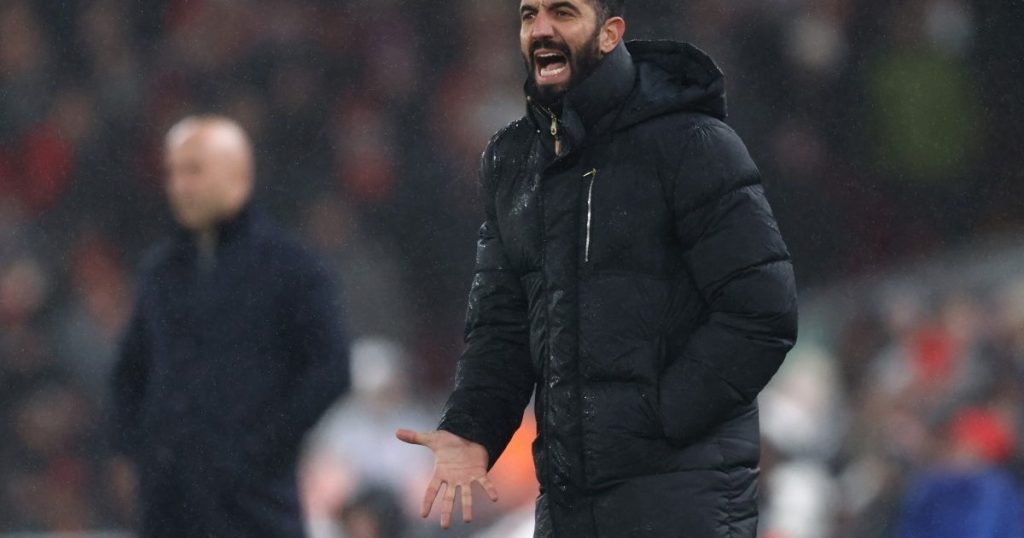The pressure mounts on Manchester United manager Rúben Amorim as he navigates a turbulent season, frankly acknowledging that he and his players are “fighting” for their jobs. Amorim, who took the helm after the dismissal of Erik ten Hag in November, faces a daunting task of revitalizing a struggling squad, especially in the wake of controversial January transfer window decisions. The club’s choice to bolster their defensive ranks with young talents Patrick Dorgu and Ayden Heaven while simultaneously loaning out key attacking players like Marcus Rashford and Antony, along with defender Tyrell Malacia, has raised eyebrows and intensified scrutiny on Amorim’s leadership. The loan of Rashford, a homegrown talent, to Aston Villa, with a potential option for a permanent move, has been particularly contentious, symbolizing the gamble Amorim has taken in reshaping the squad. Amorim, however, remains resolute, deflecting questions about Rashford’s future and emphasizing his focus on the players currently at his disposal.
Amorim’s gamble reflects a calculated risk, a conscious departure from previous transfer strategies that have yielded mixed results. He acknowledges the inherent difficulty in transforming the team’s performance in such a short time frame, recognizing the challenging road ahead until the season’s end. The decision to prioritize young, albeit highly-rated, defenders over established attacking reinforcements, especially given the existing attacking gaps, underscores Amorim’s long-term vision. He believes in nurturing different player profiles within the squad, a philosophy he believes will ultimately pay dividends. This strategy, however, carries significant risk, especially given the team’s current precarious position in the Premier League. Amorim readily admits the pressure he faces, operating in a results-driven environment where immediate success is paramount.
The January transfer window activity reveals a conscious effort by Manchester United to break free from past transfer missteps. Amorim stresses the club’s commitment to a more measured, strategic approach, avoiding the impulsive decisions that have sometimes plagued their recruitment history. The emphasis is on maximizing the potential of the existing squad while carefully identifying and integrating new talent. This patient approach, however, contrasts sharply with the urgent need for improved results. The tension between long-term squad building and the immediate pressure to climb the league table creates a complex challenge for Amorim, demanding a delicate balancing act between strategic foresight and immediate performance gains.
Amorim’s conviction in his chosen path is unwavering. He reiterates his clear vision for the team, emphasizing that his decisions, however unconventional, are driven by a belief in their long-term efficacy. He acknowledges the inherent risks involved but remains steadfast in his approach. This unwavering self-belief is crucial in navigating the turbulent waters of managing a club of Manchester United’s stature, particularly during a period of underperformance. However, Amorim also demonstrates pragmatism, recognizing the realities of the situation. He understands that football is a results-driven business and that his long-term vision will only be realized if he can deliver tangible results in the short term. This acknowledgement of the pressure he faces underscores the precarious nature of his position.
Adding to the complexity of the situation is the return of Ruud van Nistelrooy, a former Manchester United star striker, to Old Trafford. Van Nistelrooy, now managing Leicester City, faces his former club in the FA Cup fourth round, adding a layer of intrigue to an already challenging fixture for Amorim. This encounter carries symbolic weight, pitting Amorim against a figure deeply embedded in United’s history, further highlighting the scrutiny under which the current manager operates. The FA Cup tie represents not only a crucial opportunity for silverware but also a chance for Amorim to demonstrate his tactical acumen against a formidable opponent with intimate knowledge of the club.
The timing of the Leicester match coincides with the devastating news of Lisandro Martínez’s season-ending injury. Martínez, a key defensive figure, suffered cruciate ligament damage, dealing a significant blow to United’s already depleted squad. This injury further underscores the risk associated with Amorim’s transfer window decisions, exacerbating the defensive vulnerabilities and placing even greater pressure on the young defenders brought in during January. The loss of Martínez, combined with the loan departures of other players, leaves Amorim with a thinner squad and fewer tactical options, adding another layer of difficulty to an already challenging situation. Amorim must now navigate this period of adversity, demonstrating his managerial ability to adapt to unforeseen circumstances while maintaining his focus on achieving positive results. The confluence of these factors—the pressure to perform, the controversial transfer decisions, the return of a club legend, and a significant injury setback—creates a crucible for Amorim, testing his leadership and managerial skills in the most demanding of circumstances.














